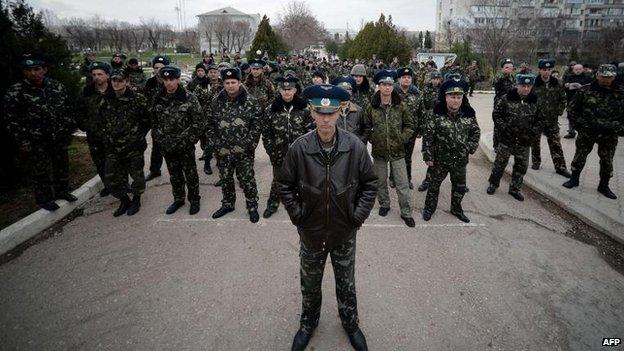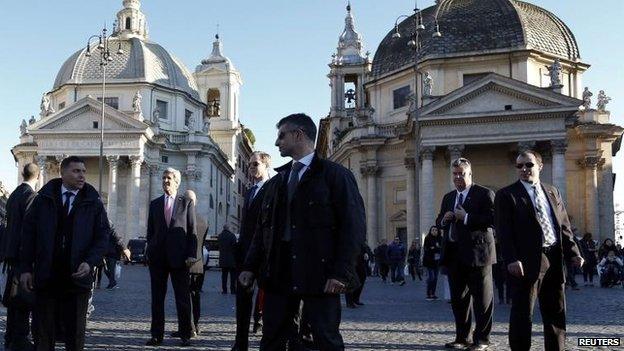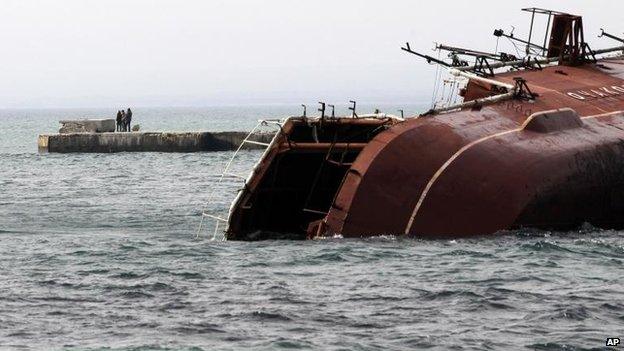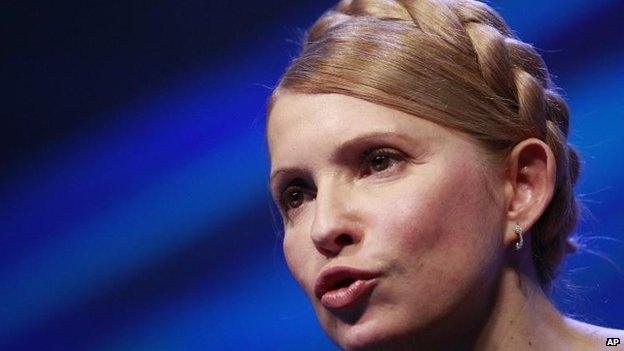Ukraine crisis: 'Illegal' Crimean referendum condemned
- Published
President Obama: "The proposed referendum... would violate international law"
The EU and US have joined Ukraine's government in condemning as "illegal" a move by the Crimea region to set up a referendum to endorse joining Russia.
The EU, meeting in Brussels, threatened "serious consequences" if Russia did not act to de-escalate the crisis.
Crimean MPs earlier set a date of 16 March for a vote on the referendum.
Russian troops took de facto control of Crimea, whose population is mostly ethnic Russian, in the wake of the fall of Ukraine's pro-Moscow president.
The Crimean parliament on Thursday said it had decided "to enter into the Russian Federation with the rights of a subject of the Russian Federation".
It said it had asked Russian President Vladimir Putin "to start the procedure".
US President Barack Obama urged President Putin to seek a diplomatic solution to the crisis in Ukraine, when he spoke to the Russian leader by telephone for an hour.
President Obama stressed that Russia's actions were a violation of Ukrainian sovereignty, a White House statement said.
For his part, Mr Putin said that US-Russian "relations should not be sacrificed due to disagreements over individual, albeit extremely significant, international problems," the Kremlin said.
It was the two leaders' second telephone call concerning Ukraine in less than a week.
'Highly precarious'
Before the Brussels summit, some EU members - led by Germany - had indicated they preferred mediation with Russia to try to solve the crisis, rather than any stronger measures.
But correspondents say the Crimean MPs' move has clearly toughened the line taken by the EU.
In press conferences after the talks, German Chancellor Angela Merkel and EU Council President Herman Van Rompuy both said the Crimean referendum was contrary to the Ukrainian constitution and therefore illegal.
The EU said it was suspending talks with Moscow on easing travel restrictions on Russians entering the EU.
It said that if Russia did not move to de-escalate the situation quickly, it would "decide on additional measures, such as travel bans, asset freezes and the cancellation of the EU-Russia summit".
The BBC's Christian Fraser describes the tense atmosphere on board a blockaded Ukrainian warship

Sevastopol Air Base troops face up to Ukrainian pro-Russian protesters in Belbek

John Kerry (3rd from left), visiting Rome, said: "Crimea is Ukraine"

Russian seamen scuttle the Russian anti-submarine ship Ochakov outside the Crimean town of Myrnyi to block the exit of Ukrainian naval vessels

Speaking in Dublin, Ukrainian former premier Yulia Tymoshenko made an emotional appeal for greater European integration
The EU statement , externalsaid that "any further steps by the Russian Federation to destabilise the situation in Ukraine would lead to severe and far-reaching consequences... which will include a broad range of economic areas".
US President Barack Obama said the Crimea referendum would "violate the Ukrainian constitution and international law".
He said there was a way to resolve the crisis with Russia through diplomacy but that "if the violation continues, the resolve of the US and its allies will remain firm".
Mr Obama praised the "international unity on display at this moment".
The US had earlier issued visa restrictions on a number of unnamed Ukrainian and Russian officials and individuals "to deny visas to those responsible for, or complicit in, threatening the sovereignty and territorial integrity of Ukraine".
UK Prime Minister David Cameron said the situation remained "highly precarious, the slightest miscalculation could see it spiral out of control".
He drew parallels with World War Two, saying: "It matters because we know from our history that turning a blind eye when nations are trampled all over and their independence trashed... that stores up far greater problems for the long run."
Speaking in Dublin, Ukrainian former premier Yulia Tymoshenko made an emotional appeal for greater European integration.
She said: "We are building a European nation - we are doing this and nobody can stop us. We owe this to those who died and to those who are living."
The BBC's Chris Morris in Brussels says it may still be difficult for the EU to agree on tougher sanctions.
He says that although some states, particularly those close to Russia's border, argue that Europe must take a stand, most member states are desperate to avoid a lengthy economic conflict with Russia.
First Deputy Prime Minister Rustam Temirgaliev tells the BBC's John Simpson: "Crimea now is Russia"
In a televised address, Ukraine's Interim President Olexander Turchynov denounced the referendum as "illegitimate and unnecessary, it contradicts the will of the Ukrainian people".
He cited Article 73 of the Ukrainian constitution, external which says issues relating to borders must involve a "referendum across the whole of Ukraine".
Mr Turchynov said: "Ukraine's territory within the boundaries recognised by the whole world is inviolable and sovereign."
But Crimea's First Deputy PM Rustam Temirgaliev said Crimea viewed the new authorities in Kiev as illegitimate and that Crimea was now in Russia.
Speaking in Rome, US Secretary of State John Kerry said: "Crimea is part of the Ukraine. Crimea is Ukraine."
Pro-Russian gunmen had moved in to seize strategic sites in Crimea after Viktor Yanukovych was ousted as the president of Ukraine following months of protests in Kiev.
The demonstrations - by Ukrainians seeking closer ties with the West - turned violent in mid-February with more than 90 people killed in clashes with police.

Are you in the affected region? Email us at haveyoursay@bbc.co.uk, external adding 'Ukraine' in the subject heading and including your contact details.